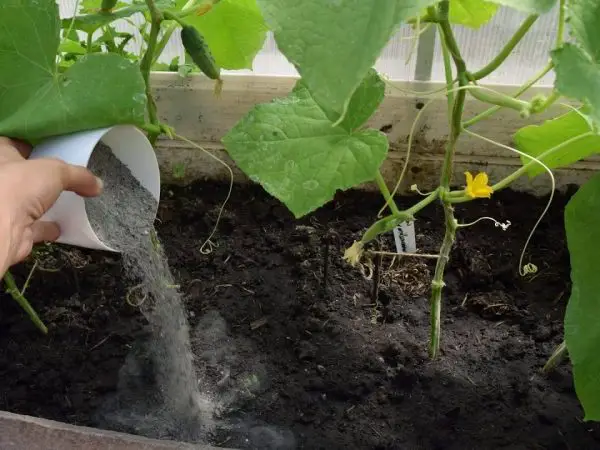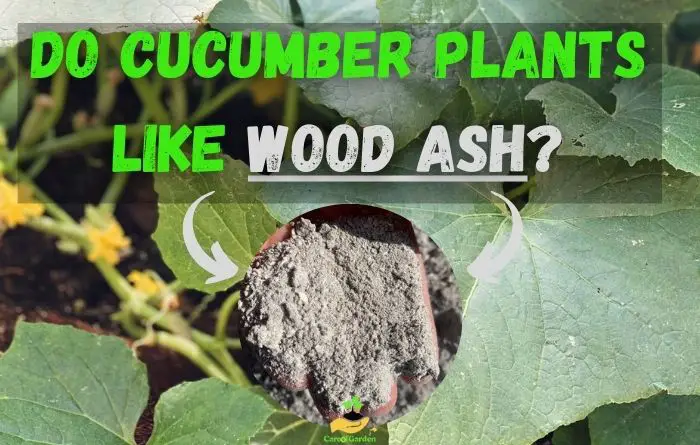Do Cucumber Plants like Wood Ash? Here is the Truth!
Are you looking for a natural way to give your cucumber plants a boost? Then you might want to consider using wood ash! But the question that often comes up is, do cucumber plants like wood ash?
Using my gardening expertise, I will answer this question and show you the advantages and disadvantages of using wood ash on your cucumber plants.
Do Cucumbers Plants like Wood Ash?
Although cucumbers may not necessarily benefit from using wood ash in the garden due to its potential to raise soil pH too high, it can be used in moderation with other amendments to help balance soil pH and provide nutrients. It is important to take precautions when using wood ash in the garden, such as avoiding using too much and testing soil pH before use.
Excessive use of wood ash can lead to overly alkaline soil, causing imbalances in nutrient availability and negatively affecting cucumber growth. It’s crucial to monitor soil pH and nutrient levels and adjust wood ash application accordingly.
The high pH level of wood ash can affect the availability of certain nutrients in the soil, such as iron, manganese, and zinc, which are essential for cucumber growth. Additionally, calcium carbonate in wood ash may increase soil pH, thus reducing cucumber plant ability to intake nutrients from the soil.
However, some sources suggest that cucumbers can benefit in some way from wood ash if it is used in moderation and mixed with other amendments, such as compost or peat moss, to help balance the pH of the soil. This mix should be applied in the fall or winter, before planting your cucumbers.
The study I found, called Assessment of indigenous plant extracts in combination with synthetic insecticide and wood ash for the management of red pumpkin beetle Aulacophora foveicollis, found that the use of wood ash in combination with insecticide resulted in higher cucumber yields compared to using insecticide alone.
It is important to take precautions when using wood ash in the garden, such as avoiding using too much and testing soil pH before use.
The Pros of Using Wood Ash for Cucumbers Plants
Using wood ash for cucumbers can offer several benefits that contribute to their growth and overall health:
- Supply of Essential Nutrients: Wood ash contains valuable nutrients like calcium, potassium, and magnesium, which are essential for cucumber plant growth. Incorporating wood ash into the soil can provide a natural source of these nutrients, promoting robust foliage, flowering, and fruit development.
- Soil pH Adjustment: Cucumber plants thrive in slightly acidic to neutral soils. Wood ash has alkaline properties that can help balance soil pH if it’s too acidic. Proper pH levels improve nutrient availability, ensuring cucumbers can efficiently take up the nutrients they need.
- Potassium Boost: Wood ash is particularly rich in potassium, a nutrient crucial for flowering, fruiting, and overall plant vitality. Adequate potassium levels can enhance cucumber yield and quality.
- Soil Structure Improvement: Wood ash can enhance soil structure, especially in clay soils. Its fine particles can help improve drainage and aeration, creating an environment conducive to healthy root growth.
- Natural Pest Deterrent: Wood ash’s abrasive texture can deter certain pests, such as slugs and snails, from approaching cucumber plants. This can help reduce pest damage and the need for chemical interventions.
- Reduced Need for Chemical Fertilizers: By supplying essential nutrients, wood ash can reduce the reliance on synthetic fertilizers. This can lead to more environmentally friendly cultivation and potentially save costs.
The Cons of Using Wood Ash for Cucumbers Plants
While using wood ash can provide benefits for cucumber plants, there are also potential drawbacks to consider:
- Altered Soil pH Levels: Wood ash is alkaline in nature, which means it can raise the pH of the soil. Cucumbers prefer slightly acidic to neutral soil conditions. Excessive use of wood ash can lead to an unfavorable pH imbalance, affecting nutrient availability and potentially harming cucumber plants.
- Nutrient Imbalance: While wood ash contains valuable nutrients, including calcium, potassium, and magnesium, excessive application can disrupt the balance of other essential nutrients like phosphorus and micronutrients. This can hinder nutrient uptake and lead to deficiencies.
- Risk of Salinity: Wood ash contains soluble salts that, when overapplied, can lead to soil salinity. High salt levels in the soil can inhibit water uptake by plant roots, causing water stress and negatively impacting cucumber growth.
- Limited Nitrogen Content: While wood ash provides potassium and other nutrients, its nitrogen content is relatively low. Cucumber plants require sufficient nitrogen for vigorous growth and foliage development.
- Slow Decomposition: Wood ash takes time to break down in the soil. Excessive application can lead to the accumulation of undecomposed ash, which may hinder root growth and nutrient absorption.
How to use Wood Ash on Cucumbers Plants

Here’s a step-by-step guide, on how to effectively use wood ash on your cucumber plants:
- Test the soil pH: Before applying wood ash to your cucumber plants it’s essential to test the soil pH. If the pH is already high using wood ash may not be necessary or could potentially harm the plants.
- Collect wood ash: Gather some dry wood ash from your fireplace or wood stove.
- Get the Wood Ash Ready: Combine the wood ash with organic materials like compost or aged manure. This mixture will help balance the soil pH and provide nutrients for your cucumber growth.
- Apply the Wood Ash: Sprinkle the wood ash mixture around the base of your cucumber plants, being careful not to get it on leaves or stems. Use a rake or a garden fork to blend it into the layer of soil.
- Water thoroughly: Give your cucumber plants a watering after applying the wood ash mixture. This will allow the nutrients to penetrate into the soil effectively.
- Observe plant health: Keep an eye on your cucumber plants, for any signs of stress or damage as you continue with this method.
- Check pH Again: After a while, check the pH again. If you notice any indications of cucumber damage or if the pH of the soil becomes excessively alkaline, it would be advisable to discontinue the use of wood ash and consider using a soil amendment.
How Much Wood Ash to Use for Cucumber Plants
| Situation | Application | Amount of Wood Ash | Frequency | Caution |
|---|---|---|---|---|
| Mature Cucumber Plants | Sprinkle around the cucumber base Work into soil | 1/4 to 1/2 cup per cucumber plant | 1-2 times a year | Start with small amount, monitor response Test soil pH before and after |
| Newly Planted Cucumbers | Mix into planting hole soil | About 1 tablespoon per hole | Before placing seedling | Start with small amount, monitor response Avoid applying during growing season or flowering |
https://www.almanac.com/video/how-use-wood-ash-vegetable-garden
When to Apply Wood Ash on Cucumber Plants
The optimal timing for adding wood ash to cucumber plants is either in the spring before planting them or in the fall after harvest. This allows the wood ash to blend with the soil providing nutrients for the cucumber plants.
As a piece of advice, refrain from applying wood ash during the growing season, as it may potentially damage and hinder their growth. Furthermore, I recommend you to test the soil pH levels when using wood ash to prevent raising the pH too high.
Alternatives to Wood Ash
As I researched whether cucumbers like wood ash, I found that using wood ash as a fertilizer is not the only option available, and there are some alternatives to wood ash that you can use for cucumber plants:
Compost
Composting offers an opportunity to recycle waste and create a fertilizer that’s packed with essential nutrients for your cucumber plants. The compost provides a source of nitrogen, phosphorus and potassium, which are vital for healthy plant growth.
To make your compost here is a simple, step-by-step guide you should follow. Once your compost is fully mature, you can mix it into the soil. Use it as a top dressing, for your cucumber plants.
Manure
Another option for fertilization is using manure. Each of the following types of manure can be used to fertilize your cucumbers: cow, horse, and chicken. However, it’s important to note that fresh manure can potentially harm your plants if not properly composted before use.
Commercial Fertilizers
For those that don’t have access to compost or manure, commercial fertilizers can be a solution to feed your cucumber plants. Usually, commercial fertilizers come in liquid or slow-release forms and contain a balanced blend of nutrients that support your cucumber plant growth.
Always follow the manufacturers instructions when using fertilizers and avoid over-fertilizing your cucumbers because excessive nutrient levels can lead to issues, like nutrient burn and other complications.
Conclusion
To make the most of wood ash’s potential benefits while avoiding potential downsides, conduct a soil pH test, apply wood ash in moderation, and closely monitor soil conditions and cucumber plant health.
By striking the right balance, you can enhance your cucumber gardening experience with wood ash as a natural soil amendment.




